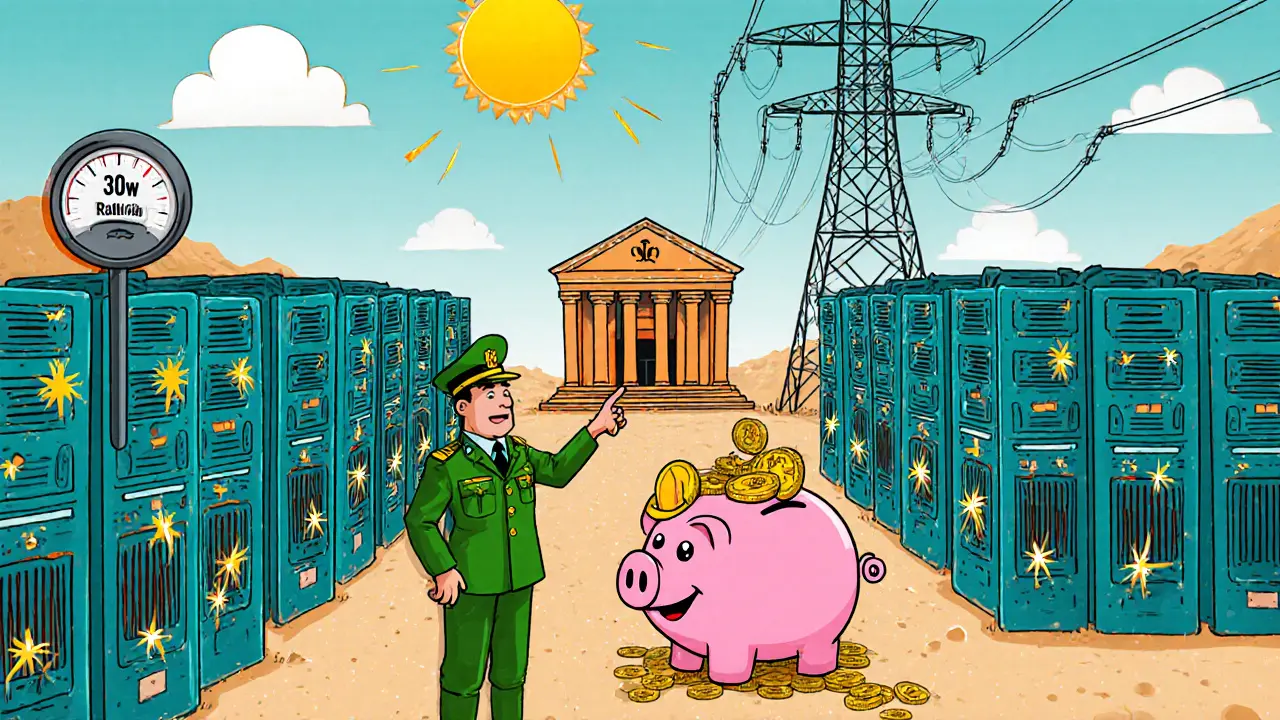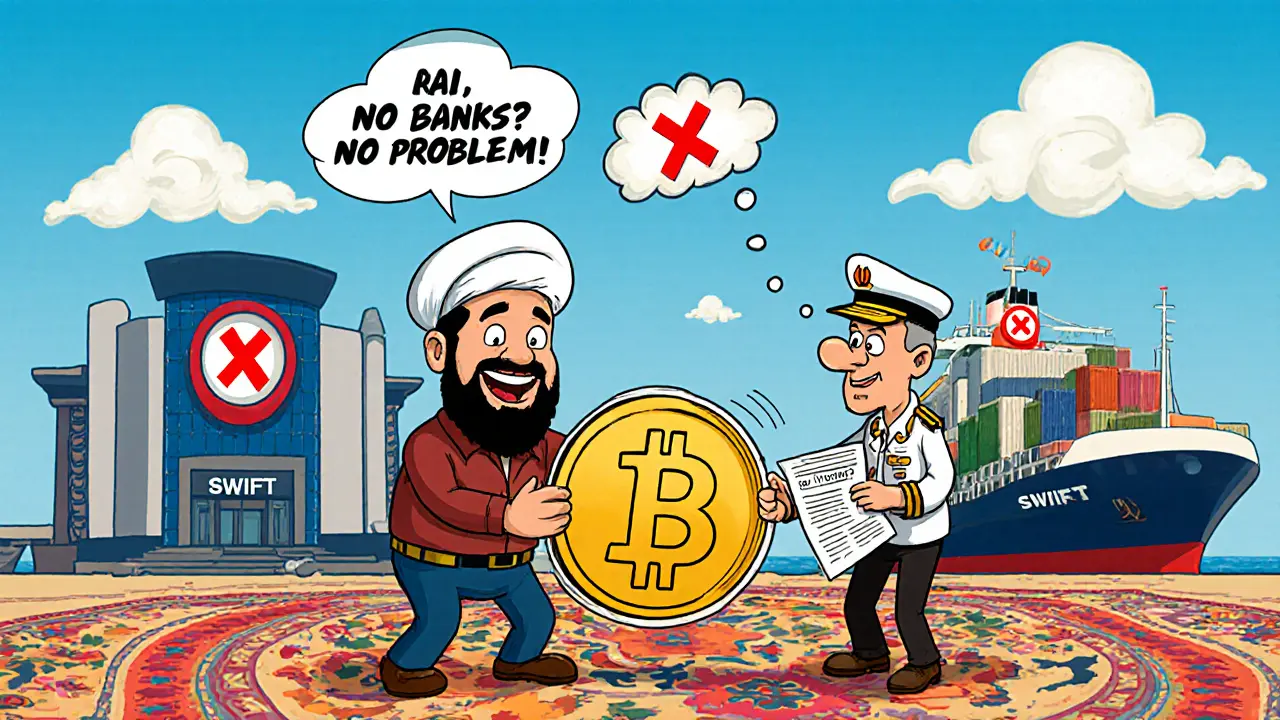Iran Crypto Import Value Calculator
Scenario Parameters
Adjust the parameters below to simulate different import value scenarios using Bitcoin for trade.
Estimated Results
Enter values and click "Calculate Import Value in BTC" to see results.
Imagine trying to ship oil, steel or food into a country that most banks refuse to touch. That’s the daily reality for many Iranian importers, and they’ve found a surprising shortcut: Bitcoin.
When we talk about Bitcoin is a decentralized digital currency that operates on a peer‑to‑peer network without a central authority, we’re not just discussing an investment asset. Iran has turned this technology into a makeshift bridge around international sanctions.
Key Takeaways
- The Central Bank of Iran authorizes licensed miners to sell Bitcoin for import settlement.
- IRGC‑linked farms generate up to 5% of global Bitcoin supply, fueling the trade pipeline.
- Since 2023, crypto‑enabled imports have moved $4.2billion out of Iran, a 70% annual jump.
- Energy‑intensive mining strains the power grid, prompting periodic shutdowns.
- Volatility, compliance hurdles, and regulatory flux keep the model fragile.
Why Iran turned to Bitcoin for imports
Sanctions slashed Iran’s access to the SWIFT network and limited dollar‑based trade. Rather than wait for diplomatic relief, Tehran asked: "What if we could pay with something that no single government controls?" The answer arrived in 2018 when the government legalized crypto mining, offering cheap electricity as a lure.
The Central Bank of Iran (CBI) the nation’s monetary authority that enforces currency controls quickly drafted a dual‑track framework. Domestic payments in crypto remain banned, but licensed miners can sell their coins to the CBI, which then uses the proceeds to settle import invoices. This creates a closed loop: miners→CBI→foreign suppliers.
The dual regulatory framework
Three state bodies keep the system in check:
- Ministry of Energy oversees electricity allocation for industrial activities allocates cheap, subsidized power to approved mining zones.
- Iran Cyber Police (FATA) a specialized unit that monitors illicit crypto activity enforces AML/KYC reporting for every coin movement.
- The Central Bank of Iran controls all authorized crypto transactions and issues export licences acts as the final gatekeeper for cross‑border settlements.
Licensing is tight: mining farms must register as industrial facilities, and only state‑approved pools can aggregate the mined Bitcoin for export. Any attempt to bypass the CBI’s portal results in heavy fines or seizure.

Mining farms, energy, and the IRGC
Behind the scenes, massive farms churn out the Bitcoin that fuels trade. The most famous is the Rafsanjan mining farm a 175‑megawatt Bitcoin operation in Kerman province, reportedly a joint venture between an IRGC‑linked enterprise and Chinese investors.
The Islamic Revolutionary Guard Corps (IRGC) a powerful military and economic organization that directs many strategic sectors has become the de‑facto manager of these farms. By harnessing rock‑bottom electricity tariffs, the IRGC extracts Bitcoin that later pays for oil, machinery, and food imports.
Energy consumption is staggering. A single ASIC miner uses roughly 3kW; a farm of 10,000 units can drain 30MW, enough to light up a small city. Critics link these loads to nationwide blackouts, especially during summer peaks.
How a crypto import transaction actually works
- Licensed miner sells freshly mined Bitcoin to a state‑approved pool.
- The pool aggregates the coins and forwards them to the CBI’s crypto wallet.
- The CBI converts the Bitcoin into a stablecoin or directly transfers it to the foreign supplier’s wallet, usually on a global exchange.
- The supplier confirms receipt and ships the goods. Settlement is recorded on a smart contract, providing immutable proof of payment.
- All steps are logged for AML/KYC compliance, and the CBI issues an export licence for the transaction.
Because the CBI controls the wallet, Iranian importers never hold the crypto themselves. This design satisfies sanctions offices while still enabling cross‑border value flow.
Economic impact: numbers that matter
Analysts project Iran’s crypto sector to generate $1.5billion in 2025, growing at 23.7% annually. Mining alone could bring in $1billion per year. By the end of 2024, about $4.2billion worth of crypto left Iran, a 70% increase from the previous year.
In 2022 the country licensed more than 10,000 mining farms and operated around 90 cryptocurrency exchanges. Today, roughly five percent of all newly minted Bitcoin can be traced to Iranian hashpower.
The first documented crypto import was a $10million purchase on August9,2023, followed by $8billion of transactions processed through the exchange Binance on behalf of IRGC‑linked firms. These moves have kept essential commodities flowing despite dollar shortages.

Challenges and risks
Volatility is the biggest headache. A 10% swing in Bitcoin’s price can turn a $1million import bill into $1.1million overnight, squeezing thin profit margins. Companies mitigate risk with forward contracts on stablecoins, but the market for such instruments in Iran remains nascent.
Regulatory drift adds uncertainty. The CBI can tighten export licences or shut down a mining pool with little notice. Recent orders to close rial‑based payment gateways for exchanges illustrate how quickly policy can shift.
Energy constraints are a structural bottleneck. Power outages stall mining rigs, cutting hashpower and, consequently, the supply of Bitcoin available for trade. The government’s occasional bans on mining during winter shortages underscore this vulnerability.
International scrutiny is rising. Sanction‑watching bodies monitor large crypto outflows, and any misstep could invite secondary penalties on Iranian entities.
Future outlook: can the model survive?
Experts see a mixed picture. On one hand, the crypto‑enabled import channel offers a lifeline that can be expanded with more stablecoins and better compliance tools. On the other, the energy crisis, price swings, and possible tighter sanctions could choke the system.
If Iran can secure dedicated renewable energy for mining-solar farms in the south, for example-the power‑grid strain might ease. Simultaneously, forging deeper crypto‑cooperation with allies like Russia could broaden the pool of willing counterparties.
Ultimately, Bitcoin will remain a strategic lever as long as the CBI controls the gateway and the IRGC continues to subsidize mining. The question isn’t whether the model works; it’s whether it can stay sustainable without crippling the country’s own infrastructure.
Comparison: Traditional import payments vs. Bitcoin‑enabled imports
| Aspect | Traditional Banking | Bitcoin‑Enabled Imports |
|---|---|---|
| Speed | 3-10business days (SWIFT delays, sanctions checks) | Minutes to a few hours (blockchain confirmation) |
| Sanction Risk | High - banks must block prohibited parties | Medium - CBI vetting, but blockchain is non‑bank‑centric |
| Transparency | Low - opaque correspondent banking network | High - immutable ledger records every transfer |
| Cost | 2-5% of transaction value (fees, intermediaries) | 0.5-1% (network fee + CBI processing) |
| Energy Use | Negligible | Significant - mining farms consume large power |
Frequently Asked Questions
Can any Iranian business use Bitcoin for imports?
Only firms that have a licence from the Central Bank of Iran and are linked to an approved mining pool can settle imports with Bitcoin. Unlicensed traders risk seizure and heavy fines.
How does the Central Bank actually receive the Bitcoin?
Licensed miners sell their freshly mined coins to a state‑approved pool, which then transfers the Bitcoin to a CBI‑controlled wallet. The CBI can hold, trade, or convert it as needed.
What role does the IRGC play in this ecosystem?
The IRGC backs large mining operations, provides political protection, and channels mining revenue into the national trade fund. Its involvement ensures cheap electricity and security for the farms.
Is Bitcoin price volatility a show‑stopper?
Volatility adds risk, but many importers hedge by converting Bitcoin to stablecoins or by using forward contracts on local exchanges. The CBI also buffers price swings by holding reserves.
Will Iran’s power grid survive continued mining?
The grid is already strained. Without a shift to dedicated renewable sources or subsidised power for miners, frequent blackouts are likely, which could force the government to curb mining activity.

This is just another way for the Iranian regime to bypass sanctions and fund terrorism. Bitcoin isn't some magical loophole-it's a tool for rogue states to steal from the global financial system. The US needs to crack down on these crypto flows hard, not pretend it's "economic innovation."
Sanctions exist for a reason. Let them starve.
It’s wild to think that a decentralized tech meant to liberate people from banks is now being used by a state to keep its economy alive. There’s irony here, but also a grim pragmatism.
People just want food, medicine, fuel. If Bitcoin is the only bridge left, is it really wrong? Or are we just mad because it’s not our system that’s failing?
Wow! 🌍✨ This is like modern-day digital Silk Road-except instead of spices and silk, it’s life-saving medicine and steel! India has always admired Iran’s resilience, and this crypto strategy? Pure genius under pressure. 🇮🇷💪
Imagine if we used blockchain for humanitarian aid globally-no more corruption, no more delays. Just direct, transparent value flow. The future is here, and it’s mined in Kerman! 🤖⚡
So let me get this straight-Iran mines Bitcoin using subsidized power, sells it to their own central bank, and uses it to buy food while their citizens get blackouts? Classic.
Meanwhile, my crypto wallet is still sitting at -30% and I’m out here thinking "maybe I should’ve bought Dogecoin." 😅
This isn’t just about sanctions-it’s about survival. Nigeria’s been fighting currency controls for years. If Bitcoin lets a nation feed its people while the West plays chess with economic warfare, then yes, it’s a tool of resistance.
Stop calling it "illicit." Call it adaptive. The people aren’t the enemy. The system is.
5% of global Bitcoin mining from Iran? That’s insane. But honestly, I’m not surprised. We know how much power they have in mining. And the IRGC running it? Of course they are. They run everything.
Still, the fact that it works at all says something about Bitcoin’s real power-not as speculation, but as infrastructure.
The structural reliance on energy-intensive mining as a state-sanctioned financial tool raises serious ethical and environmental questions. While the outcome-access to essential goods-is morally compelling, the method undermines global efforts toward sustainable economic development.
Is this innovation-or exploitation masked as necessity?
Bitcoin is a scam. Iran is a dictatorship. Both deserve to collapse.
Stop glorifying this.
Sanctions work. Let them feel it.
Look, I get the outrage-but what’s the alternative? Let children go without insulin because a bank won’t process a wire? This isn’t crypto evangelism. This is survival engineering.
Yes, the grid is stressed. Yes, the IRGC profits. But right now, this system is keeping millions alive. That’s not a loophole-it’s a lifeline. Let’s not pretend we’d do better if we were in their shoes.
5% of Bitcoin mined in Iran? Bro that’s like the whole crypto world is powered by one country’s desperation 🤯
And still people say crypto is useless? Nah man. This is real world magic. Power grid? Blackouts? Whatever. They’re buying bread with code. That’s next level.
The technical details are fascinating, but the ethical implications are too complex to ignore. The IRGC’s involvement and the energy costs make this a deeply problematic model, even if it achieves short-term humanitarian goals. There must be better alternatives.
So... they’re using electricity meant for homes to mine Bitcoin... so they can buy food... while people in Tehran are getting blackouts... and you’re calling this "innovation"? I’m sorry, but this isn’t clever-it’s tragic. And the fact that people are praising it? That’s the real tragedy.
It’s like setting your house on fire to cook dinner.
While the humanitarian necessity of maintaining import flows is undeniable, the institutionalization of Bitcoin mining under the IRGC represents a dangerous normalization of illicit economic activity. The centralization of control through the CBI undermines the very decentralization ethos Bitcoin was founded upon.
This is not financial sovereignty-it is state capture masquerading as technological adaptation.
I get why people are mad about the IRGC profiting-but let’s not forget who’s really suffering here: the middle class trying to buy medicine, the farmers needing fertilizer, the hospitals needing oxygen tanks.
Sanctions hurt civilians more than regimes. If Bitcoin is the only tool left to keep people alive, then we should be asking how to make it safer, not how to shut it down.
Imagine: a nation cut off from the global financial system, yet it’s building a parallel economy on open-source code, subsidized power, and sheer willpower. This isn’t just crypto-it’s digital nation-building.
Iran’s model could become the blueprint for other sanctioned economies: Venezuela, North Korea, even Russia if they refine it further. The blockchain doesn’t care about borders, laws, or sanctions-it just verifies transactions. And that’s terrifying… and beautiful.
What if the next global currency isn’t issued by a central bank, but by a nation that refuses to die?
Also-solar farms in the south? YES. Renewable-powered crypto sovereignty? That’s the future I want to see. 🌞⚡🇮🇷
Interesting. I didn’t realize Bitcoin had become this kind of infrastructure. Not sure if I’m impressed or disturbed.
But I guess that’s the point-it’s not about whether it’s right or wrong. It’s about what happens when systems break.
Let’s not romanticize this. The IRGC is a terrorist organization. They’re using Bitcoin to fund weapons, not just food. And yes, people are getting medicine-but at the cost of empowering a regime that oppresses its own people and threatens the region.
This isn’t innovation. It’s enabling.
One cannot help but observe the profound irony that a technology conceived as a libertarian counter-institutional mechanism has been subsumed by the most authoritarian state apparatus in the Middle East. The epistemological contradiction is not merely amusing-it is instructive.
One must question whether the decentralized ideal has been fatally compromised by its own utility to centralized power.
It is incorrect to refer to Bitcoin as a "tool" for import settlement. Bitcoin is not a currency in the legal, economic, or regulatory sense. It is a speculative asset with volatile value,不具备法定货币地位. The Central Bank of Iran’s actions constitute a violation of international financial norms and should be condemned accordingly.